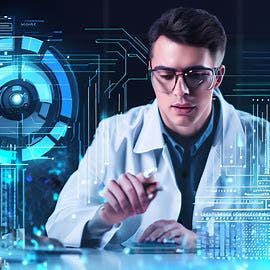
How AI is Being Used in Healthcare Now and Potential for the Future
Exploring the current applications of AI in healthcare and its promising future possibilities.
Introduction
We are hearing a lot of negative news about the potential risks of artificial intelligence, without a lot of factual evidence that I can find. Most of it is based on fear of the unknown and opaque technology demos. I am not denying that there may be real threats, but I feel that we are still pretty far away from AGI (artificial general intelligence) which is a big leap forward. What I see now is machines that are getting really good at emulating humans, and employing robotic machine skills (like machine learning, pattern recognition, natural language learning, predictive text, text to image etc.) in very narrowly defined fields.
I really don't see how passing laws to pause the research will have any meaningful effect at stopping the progress. How can they be enforced globally and by who? You can't really stop people from doing research secretly. If AI is really so powerful and strategically important then there will be a lot of incentives to develop and hide the product. For example, military use. You don't need any rare or scarce elements like uranium or plutonium. Just information and computation. I believe that this technology should not be controlled by a small group of people, and the benefits of AI should be available to everyone. If it is so powerful, we should be using it ourselves to solve our biggest problems. Here is an article which talks about how open-source generative models are the ethical way forward.
Healthcare
In recent years, AI has begun to revolutionize diagnostics by enabling more accurate and faster detection of diseases. One example is the use of deep learning algorithms to interpret medical images, such as X-rays and MRIs, which can help identify abnormalities with greater precision than human experts.
Another area where AI has made a considerable impact is drug discovery. By utilizing advanced algorithms and machine learning techniques, researchers can analyze vast amounts of data to identify potential drug candidates or therapy combinations that would be difficult or time-consuming for humans to discover.
AI is also playing a role in personalized medicine, tailoring treatments to individual patients based on their unique genetic makeup and clinical data. This approach has shown promise in oncology, where it can help determine the most effective treatment strategies for cancer patients.
In addition to these existing applications, AI has the potential to revolutionize many other aspects of healthcare. For instance, AI could enhance telemedicine by providing sophisticated health monitoring and diagnosis capabilities via remote patient consultations. Moreover, AI-powered robots could assist surgeons during complex procedures, improving both efficiency and patient outcomes.
Furthermore, AI has the potential to transform mental health care through the development of virtual therapists. These AI-driven chatbots could provide counseling and support to individuals suffering from mental health issues, increasing accessibility and reducing the stigma associated with seeking help.
Though AI holds immense promise for the future of healthcare, I agree that it is crucial to address the ethical and privacy concerns that may arise. Ensuring transparency, responsible use of data, and minimizing potential biases will be essential in harnessing AI's full potential.
Conclusion
I believe that there are a number of possible solutions to the various dangers. For example, if we are concerned about the machines becoming smarter than us maybe they can be used to augment our own intelligence, and still have control with safeguards which could be planned? Maybe they can be used to edit our own genes using CRISPR tech for example to make humans smarter. We are still early, but here is an article on the subject: https://blogs.scientificamerican.com/guest-blog/can-crispr-cas9-boost-intelligence/
Maybe we are looking at a new branch of human evolution (Homo Machinus). Who knows. There are so many different possibilities we can't even imagine them yet. But we aren't there yet. Not even close. In the mean time, we need to learn as much as can about the technology, share the research, make it transparent, and use it ourselves. If you try to restrict and hide it, it will only go underground and offshore. I think that we should start by concentrating on how to make the best use of AI tech to improve our lives now. Of course we should also be thinking about how to discourage or penalize misuse, I don't think the court system is the best approach for this kind of thing. More on that in another post.
Artificial intelligence (AI) has been making significant strides in various industries, and healthcare is a good use case. I have a special interest in this usage for AI since I have a chronic blood cancer condition that I have struggled with for more than a decade. I have gone thru 4 different treatments, and none of them have been long lasting. I am currently undergoing a phase II clinical trial of a new drug that was developed recently. I am hoping that this technology can help in researching causes, compiling and analyzing information, and developing new ones which may be more effective. Maybe even a cure some day if I am lucky.
In conclusion, AI is already making significant contributions to healthcare, and its future possibilities are vast. By continuing to develop and implement AI-driven solutions, we can look forward to a more efficient, effective, and personalized healthcare system.

